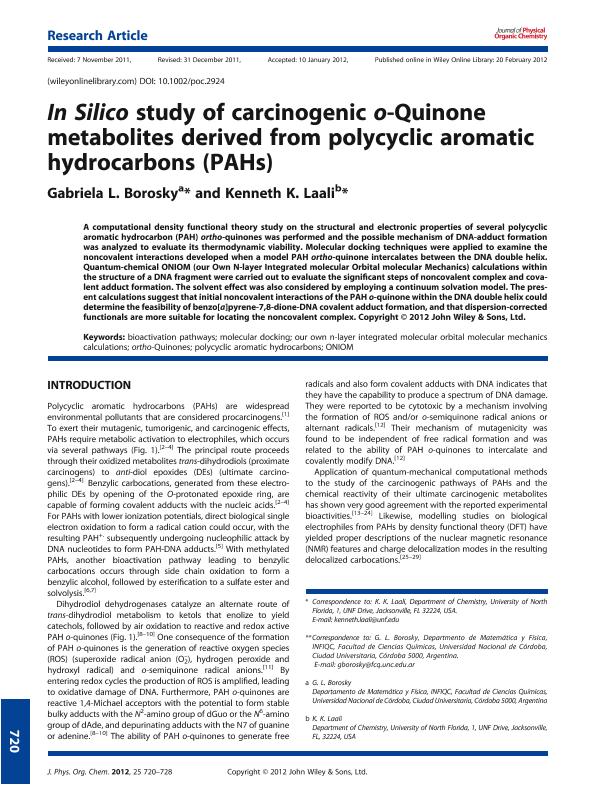Artículo
In Silico study of carcinogenic o-Quinone metabolites derived from polycyclic aromatic hydrocarbons (PAHs)
Fecha de publicación:
08/2012
Editorial:
John Wiley & Sons Ltd
Revista:
Journal Of Physical Organic Chemistry
ISSN:
0894-3230
Idioma:
Inglés
Tipo de recurso:
Artículo publicado
Clasificación temática:
Resumen
A computational density functional theory study on the structural and electronic properties of several polycyclic aromatic hydrocarbon (PAH) ortho-quinones was performed and the possible mechanism of DNA-adduct formation was analyzed to evaluate its thermodynamic viability. Molecular docking techniques were applied to examine the noncovalent interactions developed when a model PAH ortho-quinone intercalates between the DNA double helix. Quantum-chemical ONIOM (our Own N-layer Integrated molecular Orbital molecular Mechanics) calculations within the structure of a DNA fragment were carried out to evaluate the significant steps of noncovalent complex and covalent adduct formation. The solvent effect was also considered by employing a continuum solvation model. The present calculations suggest that initial noncovalent interactions of the PAH o-quinone within the DNA double helix could determine the feasibility of benzo[a]pyrene-7,8-dione-DNA covalent adduct formation, and that dispersion-corrected functionals are more suitable for locating the noncovalent complex. Copyright © 2012 John Wiley & Sons, Ltd.
Archivos asociados
Licencia
Identificadores
Colecciones
Articulos(INFIQC)
Articulos de INST.DE INVESTIGACIONES EN FISICO- QUIMICA DE CORDOBA
Articulos de INST.DE INVESTIGACIONES EN FISICO- QUIMICA DE CORDOBA
Citación
Borosky, Gabriela Leonor; Laali, Kenneth K.; In Silico study of carcinogenic o-Quinone metabolites derived from polycyclic aromatic hydrocarbons (PAHs); John Wiley & Sons Ltd; Journal Of Physical Organic Chemistry; 25; 8; 8-2012; 720-728
Compartir
Altmétricas




